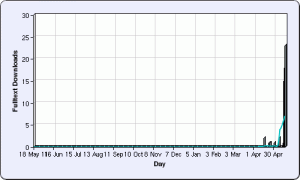Last month Melissa Terras, from the Department of Information Studies at University College London, published a blog post “Is blogging and tweeting about research papers worth it? The Verdict”. In this post she explained an experiment she conducted by which she had written blog posts giving the back story of past academic papers and providing links to the papers in the UCL repository (the equivalent to Reading’s Centaur), she then tweeted about the papers and saw a sizeable increase in the downloads.
For our experiment we decided to use a conference paper that was uploaded last month to Centaur, in line with the publishers rules this is the version we submitted not the final version that they published as part of the conference proceedings. On Tuesday I looked at Centaur and saw that it had been downloaded 7 times. I tweeted the following at 6.00 pm that evening:
“Want to know about the range of techs used by guides round the world? http://centaur.reading.ac.uk/27755/2/GTimeSubmitted120112.pdf”
(actually the url was shortened by my Twitter client).
By the next morning (Wednesday) the downloads were up to 23.
I asked the co-authors to retweet, and by the next morning (Thursday) the downloads were 39.
Yesterday I asked Pat Parslow (@PatParslow) who wasn’t an author but has worked on related projects and is a regular user of Twitter if he was willing to tweet about this work, which he did:
“Digital Literacies, Digital Divide, Visitors/Residents, Natives/Immigrants technology audit in voluntary sector http://centaur.reading.ac.uk/27755/2/GTimeSubmitted120112.pdf #WAGGGS”
He also did a second post that linked to the hashtag of an event that was happening that day.
This morning (Friday) the total downloads stand at about 64.
(apologies the graph shows the whole year but the paper was only accessible for the last two months, Centaur does not allow users to extract data over a specified period).
There is some overlap in the downloads, presumably some people who follow more than one of us have downloaded it more than once.
But the number of people who have seen our work has increased significantly. Some of the discussion generated on Twitter has suggested the methodology needs to be revised to improve the work, which will be useful as we develop the work and look to submit to a journal.
Fairly obviously the number of followers you have on Twitter makes a difference to the number of people who read your tweets, your reputation for posting interesting links will dictate whether those followers actually read the link and/or retweet it. The time of day you post will make a difference, stuff published in the middle of the night will only be read by insomniacs and those in different time zones. If there is a hashtag that is related to the work it is worth considering using it.
There is work by Gunther Eysenbach “Can Tweets Predict Citations? Metrics of Social Impact Based on Twitter and Correlation with Traditional Metrics of Scientific Impact” which has correlated Tweets about papers and the number of citations, which certainly indicates getting noticed on Twitter can help get your work cited. However there is also a downside Apoorva Mandavilli in the Nature article “Peer review: Trial by Twitter , reports that within days of publishing criticisms of papers are presented on Twitter. I’m not sure if this is actually bad because if the peer review process omitted to notice that your methodology was flawed surely you still want to know.
The paper this was based on is: S. Williams, C. Spiret, Y. Dimitriadi, R. McCrindle, Auditing Technology Uses within a Global Voluntary Organisation, Global TIME: Global Conference on Technology, Innovation, Media & Education, AAEC, Online, 2012, pp. 104-109. http://editlib.org/p/39406; the Centaur entry is http://centaur.reading.ac.uk/27755/

